#Mobin Khan
Text
Liste der Menschen, die bei den Protesten im Iran seit 16. September 2022 getötet wurden (bis 6.11):
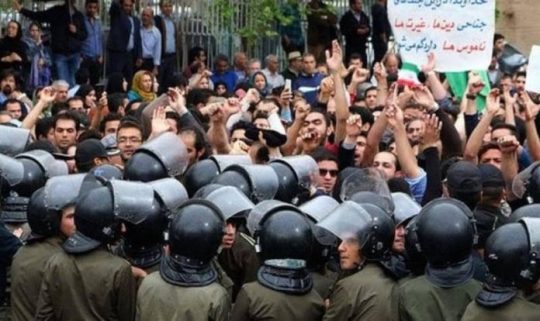
6.11.
Mohammad Ghaemi Far Asterki, Dezful
Oveis Shekarze’i, Sarbaz
5.11.
Nasrin Ghaderi, 35, Marivan
Mohammad Hossein Salari, Mahshahr
4.11. Massaker von Khash
Mohammad Shah Bakhsh
Yunus Shah Bakhsh
Shahli Bar
Sohn von Haj Khoda Murad Brahoi
Sadegh Brahui
Mohammad Amin Heshmatian
Ali Kurd Kalahori
Mobin Mirkazehi
Nima Nouri
Kambiz Regi
Rahim Dad Shahli
Sohn von Anwar Salahshuran
Mohammad Selahshuran
Abdul Malik Shahnawazi
Azim Mahmoud Zahi
Murad Zahi
Saeed Sohrab Zehi
Yasir Bahadur Zehi
3.11.
Shoaib Darghale, Chabahar
Mehdi Hazrati, Karaj
Mohammadreza Bali Lashak, Nowshahr
Prasto Mouradkhani, Karaj
Yaser Naroi, Zahedan
Mohammad Reza Sarvi, Shahr-e Rey
Mehran Shekari, Karaj
Irfan Zamani, Lahijan
2.11.
Momen Zand-Karimi, 18, Sanandaj
30.10.
Komar Daroftadeh, 16, Piranshahr
29.10.
Aref Gholampour, Zahedan
28.10.
Dastan Rasul Mohammad Agha, Baneh
Masoud Ahmadzadeh, Mahabad
Kabdani, 12, Zahedan
Adel Kochakzaei, Zahedan
Farid Koravand, Asaluyeh
Omid Narouie, Zahedan
Amir Shahnavazi, Zahedan
27.10.
Ermita Abbasi, 20, Karaj
Zaniar Abu Bakri, Mahabad
Fereshteh Ahmadi, 32, Mahabad
Keyvan Darvishi, 18, Sanandaj
Fereydon Faraji, Baneh
Shahou Khezri, Mahabad
Motalleb Saeed Peyro, Baneh
Kobra Sheikh Saqqa, Mahabad
Mehrshad Shahidi, 19, Arak
26.10.
Behnaz Afshari, Evin-Gefängnis Teheran
Afshin Asham, 28, Qasr-e Shirin
Hadi Haqshenas, Isfahan
Mohammad Lotfollahi, Sanandaj
Hamid Reza Malmir, Karaj
Ismail Muludi, 35, Mahabad
Sarina Saedi, 16, Sanandaj
Seyed Ali Seiedi, Teheran
Mohammad Shariati, Sanandaj
25.10.
Parisa Bahmani, Teheran
Parmis Hamnava, 14, Iranshahr
Ebrahim Mirzaei, 42, Sanandaj
24.10.
Sadaf Movahedi, 17, Teheran
23.10.
Ramin Fatehi, Sanandaj
Mona Naghib, 8, Saravan
22.10.
Abolfazl Bahu, Qaimshahr
Seyyed Mohammad Hosseini, Saqqez
Rahim Kalij, Qaimshahr
Poriya Kayani, Shushtar
Farid Maleki, Teheran
Arnica Kaem Maqami, 17, Teheran
Messam Moghadasi, Teheran
Sina Malayeri, Arak
Ezzatollah Shahbazi, Evin-Gefängnis Teheran
20.10.
Ali Jalili, Teheran
Ramin Karami, Kermanshah
19.10.
Ali Bani Asadi, 20, Ahvaz
17.10.
Mohammad Abdollahi, Ilam
Hamed Baji Zehi, Zahedan
16.10.
Hossein Akbarzadeh, Evin-Gefängnis Teheran
Atika Gaem Magham, 17, Teheran
15.10.
Hossein Jezi, Evin-Gefängnis Teheran
Seyyed Farhad Hosseini, Evin-Gefängnis Teheran
Hamid Saeed Mozafari, Evin-Gefängnis Teheran
13.10.
Parisa Asgari, Teheran
Reza Esmailzadeh, Teheran
12.10.
Kamal Fegghi, Bukan
Asra Panahi Jangah, 15, Ardabil
Aziz Moradi, Sanandaj
Sina Naderi, 22, Kermanshah
Armin Sayyadi, 18, Kermanshah
Mehrgan Zahmatkesh, Rasht
11.10.
Negin Abdolmaleki, 21, Hamedan
10.10.
Abolfazl Adinezadeh, Mashhad
Farzin Farrokhi, Saqqez
Omid Mahdavi, Teheran
Elaheh Sa’idi, Saqqez
9.10.
Nadia Arefani, Karaj
Arian Moridi, Salas-e Babajani
Esmail Dezvar, Saqqez
Seyyed Ahmad Shokrollahi, Isfahan
8.10.
Abolfazi Adinezadeh, 16, Maschhad
Daryoush Alizadeh, Sanandaj
Mohammad Amini, Sanandaj
Peyman Manbari, 29, Sanandaj
Mohsen Mousavi, 30, Teheran
Nagin Salehi, Teheran
Yahya Rahimi Sarab Shahraki, Sanandaj
Sopher Sharifi, Teheran
6.10.
Emad Heydari, 31, Ahvaz
Reza Bonyadi, Teheran
5.10.
Nima Shafagh Doust, 16, Urmia
3.10.
Mostafa Beriji, Zahedan
Arman Hassanzani, Zahedan
Mahmoud Hassanzani, Zahedan
Morteza Hassanzani, Zahedan
Zolfaghar Jan Hassanzani, Zahedan
Mohammad Mehrdadi, Teheran
2.10.
Jamal Abdol Naser Mohammad Hasani Barahui, Zahedan
Khodanur Lajai, Zahedan
Salman Maleki, 25, Zahedan
Saamer Hashemzehie, Zahedan
Ali Akbar Rabi’i, Isfahan
Mahuddin Shirouzehi, Zahedan
Arman Hassanzani, Zahedan
Mahmoud Hassanzani, Zahedan
Morteza Hassanzani, Zahedan
Zolfaghar Jan Hassanzani, Zahedan
1.10.
Ali Bani Assad, Ahvaz
Mokhtar Ahmadi, Marivan
Khodanour Laje’i
Ehsan Khan Mohammadi, Teheran
Pouya Rajab Nia, Babol
Mehrab Dolat Panah, Talesh
30.9.: Massaker von Zahedan
Esmail Abil
Mukhtar Ahmadi, Marivan
Abu Bakr Ali-Zehei
Lal Mohammad Alizehi
Ahmad Sarani Alizehi
Balal Anshini
Lal Mohammad Anshini
Mehdi Anshini
Musa Anshini
Suleiman Arab
Amin Goleh Bacheh
Amin Badr
Riassat Badel Balouch
Abdorrahman Balouchi
Abdolrahman Baluchikhah
Ali Barahouie, 14
Ali Akbar Barahui
Mohammad Barahui
Mahmoud Barahui
Abdulghafoor Noor Barahui
Zacharie Barahui
Abdol Samad Barahui-Aidouzehi
Mustafa Barichi, 24
Lal Mohammad Brahoui , 18
Abdul Ghafoor Dehmardeh
Mansour Dehmardeh
Musa Doveira
Mohammad Farough-Rakhsh
Mohammad Ali Gamshad-Zehei, 18
Mohammad Amin Gamshad-Zehei, 17
Mohsen Gamshad-Zehei
Salahuddin Gamshad-Zehei
Vahed Gamshad-Zehei
Saeed Gergige
Matin Ghanbarzehi, 13
Mohammad Ghaljei
Aminollah Ghaljaei
Ibrahim Gorgij
Matine Qanbar Zehi Gorgij
Amir Mohammad Gumshadzehi
Ali Akbar Halgheh-Begoush
Omran Hassanzehei
Vahid Hovat
Azizollah Kabdani
Sedis Keshani, 14
Azizullah Kubdani
Nematollah Kubdani
Mirshekari
Abubakr Nahtani
Musa Nahtani
Mohammad Eqbal Naib-Zehi
Hamid Narouei
Hamzeh Narouei
Mohammad Sediq Narouei
Younes Narouei
Abdollah Naroui
Ali Aqli Naroui
Rafi Naroui
Abdollah Naroui
Abdol Majid Naroui
Musa Dovira Narui, 18
Hasti Narui
Rafe Naroui, 23
Ali Agheli Narui,28
Abdol Vahid Tohid Nia
Javad Pousheh, 12
Aminullah Qoljai
Mohammad Qoljaei
Abdolmanan Rakhshani
Balal Rakhshani
Jalil Rakhshani
Mansour Rakhshani
Mohammad Rakhshani, 12
Heydar Narui Rashid
Abdol Majid Rigi
Behzad Rigi, 30
Mohammad Rigi
Gungo Zehi Rigi
Amir Hossein Mir Kazehi Riggi, 19
Hamid Reza Saneipour
Omid Safarzehi, 17
Omid Sarani, 12
Ahmad Sargolzaei
Abdolmalek Shahbakhsh
Abdullah Shahbakhsh
Ahmad Shahbakhsh
Danial Shahbakhsh
Daniel Shahbakhsh, 11
Farzad Shahbakhsh
Imran Shahbakhsh
Majid Shahbakhsh
Mohiuddin Shahbakhsh
Omran Shahbakhsh
Yaser Shahbakhsh
Abdol Khaleq Shahnavazi
Amir Hamzeh Shahnavazi
Mahmoud Shahnavazi
Mohammad Eghbal Shahnavazi, 16
Omar Shahnavazi
Omid Shahnavazi
Thamer Shahnavazi
Yaser Shahouzehi, 16
Jaber Shiroozehi, 12
Najm al-Din Tajik
Najmuddin Tajik
Abdol Samad Thabitizadeh
Abdul Wahid Tohidnia
Mohammad Reza Adib Toutazehi
Esmail Hossein Zahi
Hamid Isa Zehei
Jalil Mohammad Zehei
Majid Baloch Zehi
Mohammad Ali Esmail Zehi
Samer Hashem Zehie, 16
Gholam Nabi Noti Zehi
Abdol Jalil Qanbar Zehi
Khalil Qanbar Zehi
29.9.
Erfan Nazarbeigi, Teheran
28.9.
Samad Barginia, Piranshahr
Amir Mehdi Farrokhipour, 17, Teheran
Amir Reza Naderzadeh, Nowschahr
26.9.
Abdolsalam Ghader Galvani, 32, Oshnavieh
25.9.
Mohammad Jameh Bozorg, Karaj
Hamin Foulavand, Varamin
Nader Kokar, Rudsar
Milad Ostad-Hashem, 37, Teheran
Siavash Mahmoudi, 16, Teheran
24.9.
Mehdi Asgari, Garmsar
Mehrzad Avazpour, Nowschahr
Mohammad Hosseinikhah, Sari
Hossein Ali Kia Kanjouri, 23, Nowschahr
Mahmoud Keshvari, Karaj
Lina Namour, Teheran
Morteza Nowroozi, Langaroud
Mohammad Hossein Sarvari-Rad, Garmsar
23.9.
Ehsan Alibazi, 16, Shahr-e-Qods
Sarina Esmailzadeh, 16, Karaj
Hamid Fouladvand, Pakdasht
Alireza Hosseini, 26, Teheran
Seyyedeh Ameneh Vahdat Hosseini, Karaj
Javad Khansari, 36, Teheran
Hossein Morovati, Qarchak Varamin
Hediyeh Naeimani, Nowschahr
Pouya Ahmadpour Pasikhani, 17, Rasht
Ahmad Reza Qoliji, Hamedan
Parsa Rezadoust, 17, Hashtgerd
Mohammad Javad Zahedi, 16, Sari
22.9.
Kanaan Aghaei, 18, Karaj
Mehrdad Avazpour, Nowschahr
Pedram Azarnoush, 16, Dehdasht
Mehrdad Behnam-Asl, Dehdasht
Mohammad Reza Eskandari, 25, Pakdasht
Sasan Ghorbani, 32, Rezvan Shahr
Arvin Malamali Golzari, Fuladshahr
Esmail Heydari, Ardabil
Javad Heydari, 36, Qazvin
Mohammad Hossein-Khah, Mazandaran
Yaser Jafari, Ilam
Rouzbeh Khademi, 32, Karaj
Shirin Alizadeh Khansari, 35, Tschalus
Mehdi Leylazi, Karaj
Mohammad Rasoul Momenizadeh, Rasht
Mohsen Pazouki, Pakdasht Varamin
Maziar Salmanian, Rasht
Mohammad Reza Sarvari, 14, Shahr-e Ray
Setareh Tajik, 17, Teheran
Mohammad Amin Takoli, Teheran
21.9.
Matin Abdollahpour, 16, Urmia
Fereydoun Ahmadi, Saqqez
Roshana Ahmadi, Bukan
Mehdi Babr-Nejad, Gouchan
Amir Hossein Basati, 15, Kermanschah
Amir Bastami, Kermanschah
Ghazaleh Chalavi, 33, Amol
Abdolfazl Akbari Doust, Langarud
Mehdi Mohammad Fallah, 33, Amol
Mohammad Farmani, Shahr-e-Ray
Alireza Fathi, Sanfar
Amir Ali Fouladi, 16, Islamabad-e Gharb
Mohsen Geysari, 32, Ilam
Mehrdad Ghorbani, Zanjan
Milan Haghighi, 21, Oshnavieh
Saeed Iranmensh, Kerman
Yasin Jamalzadeh, 28, Rezvan Shahr
Erfan Khazaee, Shahriar
Hannaneh Kia, 22, Nowshahr
Mohsen Mohammadi Kochsaraei, Qaemchahr
Behnam Layeghpour, 37, Rascht
Sadreddin Litani, 27, Oshnavieh
Amir Hossein Mahdavi, Rasht
Mino Majidi, Qasr-e Schirin
Mohsen Mal Mir, Nowschahr
Amin M’arefat, 16, Oshnavieh
Abdolfazl Mehdipour, Babol
Mahsa Mogouei, 18, Fulad Shahr
Amir Mehdi Malak Mohammadi, Teheran
Iman Mohammadi, Islamabad-e Gharb
Saeid Mohammadi, 21, Islamabad-e Gharb
Abdollah Mohammadpour, 17, Urmia
Seyed Mehdi Mousavi, 15, Zanjan
Seyyed Sina Mousavi, Amol
Seyyed Abbas Mir-Mousavi, Langarud
Mahdi Mousavi Nikou, 16, Zanjan
Hadis Najafi, 22, Karaj
Mehrab Najafi, Zarinchahr
Amir Nowroz, 16, Bandar-e Anzali
Arash Pahlavan, 27, Machad
Danesh Rahnema, 25, Urmia
Parza Rezadoust, 17, Karaj
Erfan Rezaei, 21, Amol
Ali Mozaffari Salanghouch, 17, Gouchan
Mohammad Mam Saleh, Sardasht
Mohammed Reza Savari, 14, Haschtgerd
Amir Hossein Shams, Nowschahr
Pouya Sheida, Urmia
Morteza Soltanian, Esfahan
Mohammad Hassan Torkaman, 27, Babol
Mohammad Zamani, 16, Teheran
Mohammad Zarei, Qrachak
20.9.
Sasan Bagheri, Rezvanshahr
Farjad Darvishi, 23, Urmia
Zakaria Khayal, 16, Piranshahr
Erfan Khazaei, Zahedan
Farzin Lotfi, 35, Rezvan Shahr
Minoo Majidi, 62, Kermanschah
Diako Mehrnavaei, Bukan
Nika Shakarami, 17, Teheran
Reza Shahparnia, 20, Kermanschah
Abdolsamad Sabeti Zadeh , Zahedan
Milad Zare, 25, Babol
19.9.
Hajar Abbasi, ca. 70, Mahabad
Fardin Bakhtiari, Sanandaj
Iman Behzadpour, Sanandaj
Reza Lotfi, 25, Dehgolan
Aysan Madanpasand, Tabriz
Fereydoun Mahmoudi, 32, Saqqez
Mohsen Mohammadi, 28, Divandarreh
18.9.
Fouad Ghadimi, etwa 40, Divandarreh
16.9.
Mahsa Jina Amini, 22, Teheran
Unbekannter Todestag:
Saeid Iranmanesh, Kerman
Omid Safarzahi, 17
Afshin Shahamat, 16, Teheran
Jabir Shirouzahi, 12
Die Namen sind zusammengetragen v.a. aus folgenden Quellen:
https://english.mojahedin.org/news/iran-pmoi-mek-publishes-names-of-martyrs-of-the-iranian-peoples-nationwide-uprising/ externer Link
https://iranwire.com/en/politics/108299-remembering-victims-iran-protests-2022/ externer Link
https://www.en-hrana.org/woman-life-freedom-comprehensive-report-of-20-days-of-protest-across-iran/?hilite=244+killed externer Link
https://www.amnesty.de/sites/default/files/2022-10/Amnesty-Bericht-Recherche-Iran-Proteste-getoetete-Kinder-Jugendliche-Polizeigewalt-Oktober-2022.pdf externer Link
https://iran-hrm.com/2022/10/13/26-names-of-killed-children/ externer Link
https://www.spiegel.de/ausland/wie-iran-den-protest-bekaempft-die-blutspur-des-regimes-a-da6d644d-a42f-4271-8331-58cd291b460a externer Link
https://hengaw.net/en/news/16-kurdish-citizens-killed-in-the-protests-on-the-40th-day-death-anniversary-of-zhina-mahsa-amini externer Link
https://www.labournet.de/internationales/iran/lebensbedingungen-iran/liste-der-menschen-die-bei-den-protesten-im-iran-seit-16-september-2022-getoetet-wurden/
4 notes
·
View notes
Text
He Named Me Malala
He Named Me Malala
A look at the events leading up to the Taliban’s attack on the young Pakistani school girl, Malala Yousafzai, for speaking out on girls’ education and the aftermath, including her speech to the United Nations.
View On WordPress
#123movies#9movies#Atal Yousafzai#Free#gomovies#gostream#He Named Me Malala Online#Khushal Yousafzai#losmovie#Malala Yousafzai#Mobin Khan#movie25#movie4k#movietv#primewire#putlocker#putlockers#putlockertv#shockshare#sitename#solarmovie#Toor Pekai Yousafzai#Watch He Named Me Malala#watch32#yesmovie#Ziauddin Yousafzai
0 notes
Text
Student Testimonial GN Group of Institutes by Mobin Khan
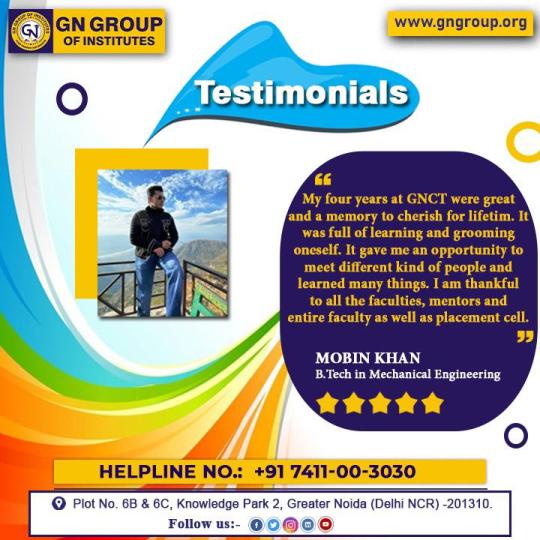
Student Testimonial GN Group of Institutes by Mobin Khan
Contact for more information:-
Phone: +91 7411003030
Website :- www.gngroup.org
#gngroup #gngroupofinstitute #colleges #DIPLOMA #BTECH #BBA #BCA #BCOM #LLB #BALLB #BCOMLLB #DPHARM #BPHARM #MBA
0 notes
Photo

Our team made a great decision with this Actor Mobin Khan playing Pakistani Mailman A MAN OF TWO WORLDS https://www.instagram.com/p/CXkmLgyrBRK/?utm_medium=tumblr
0 notes
Photo
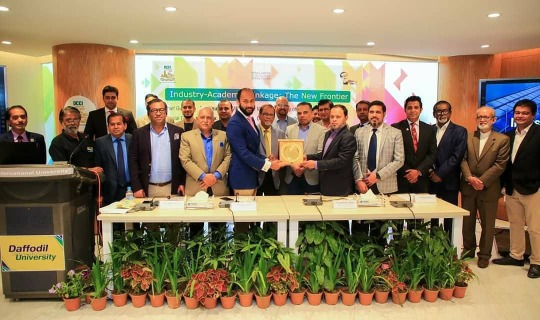
📍 A webinar titled “Industry-Academia Linkage: The New Frontier” was held at Daffodil International University, Daffodil Smart City, Ashulia, Dhaka today on 27 February 2021. 🔹The webinar was organized by Dhaka Chamber of Commerce & Industry (DCCI) where Education Minister Dr. Dipu Moni, MP joined as the chief guest and Prof. Dr. Kazi Shahidullah, Chairman, University Grants Commission (UGC) joined as the special guest. 🔹Presided over by Mr. Rizwan Rahman, President of Dhaka Chamber of Commerce & Industry (DCCI), Dr. Md. Sabur Khan, Chairman, Board of Trustees, Daffodil International University presented the keynote paper at the webinar. 🔹Mr. Syed Nasim Manzur, Managing Director, Apex Footwear Ltd. Dr. Syed Ferhat Anwar, Director and Professor of IBA, University of Dhaka, Prof. Dr. Mohammad Anisuzzaman Talukder, Professor of BUET, Tahmina Binthe Mostafa, Director, Meghna Group were present at the webinar as the discussants. 🔹DCCI Senior Vice President N K A Mobin, FCS, FCA gave vote of thanks while Vice President Monowar Hossain and members of the board of director took part in the webinar. (at Daffodil Smart City) https://www.instagram.com/p/CLzJCJDjflI/?igshid=105zs2li06lye
0 notes
Text
Home After 20 Years: Travel to Herat
words and photos By Fariba Nawa
From the 2001 issue of Afghan Magazine | Lemar-Aftaab
Journalist Fariba Nawa traveled to her hometown in 2000 which was then under Taliban rule. Here is her story.

Flies buzzed and circled around my face. I swatted them away with my hands as I slowly looked up to a dozen men watching me. Standing in line at the Iranian border waiting to cross into my hometown Herat, Afghanistan, the men stared at my face and hands - the only bared parts of my body. My hair and the rest of my body were covered in observance of Iran's dress code for women.
Keeping my eyes to the floor to avoid the ogling, the Iranian border agent called my name. My hands trembled as I handed him my Afghan passport - perhaps the least useful travel document in the world. In a matter of minutes, I would be home again after nearly 20 years. I was eight years old the last time I crossed the Silk Route. The desert I was about to cross was the frontlines of war. My parents, sister and I walked as donkeys carried our belongings for six hours until we reached safety in Iran.
My family fled Afghanistan during the Soviet invasion in 1981. We escaped to California where I grew up.
As an adult, I am Americanized but Afghanistan is in my heart and memories. I visualized returning to my grandfather's orchard home, where I used to play with my cousins and eat the sundry of fruits we picked from trees. The 5-acre home was a sanctuary from my parents' neighborhood where the boom of rockets and bullets echoed in our backyard.
The Afghan-Soviet war has turned into a civil war now as Afghans struggle to survive in the wake of more United Nations sanctions. One of the poorest countries in the world, Afghanistan is facing a severe drought as well as the threat of starvation. The Taliban, the militia ruling the majority of the country, enforce a strict code of law. In the name of religion, they forbid women from going to school or working in most fields and force men to pray. Women must travel with a male kin and wear a burqa, which covers the body like a tent with only a mesh for sight. Men must sport long, scraggly beards. This was the Afghanistan I was about to enter.
My cousin's best friend was my rented male kin or mahram traveling with me. Mobin was a merchant who traveled across Iran and Afghanistan, selling buttons and lace to survive. He saw his wife and 18-month-old son in Herat one week out of every month. Shrewd and experienced on the road, Mobin promised to take me from Iran to Afghanistan and finally back to Pakistan, where I worked as a freelance journalist.
With my American passport hidden under my bra, I held my breath as we passed Taliban customs. We rented a taxi with two other women. Mobin was also their mahram. The Taliban banned music, but the taxi driver popped in the latest Afghan folk songs and increased the volume as we headed toward Herat. An ancient city once known for its art and culture in Central Asia -- now it is the only Afghan city with a running economy.
The station wagon rolled up and down on the sand dunes. I took out my journal and wrote under my black coat. Every time a man appeared in the distant, the other women and I covered our faces with the edge of our headscarves.
"Don't worry. The Taliban are scared of women," Mobin said.
"They usually stop cars with men. The ones with women, they turn their heads."
We decided to don the burqa once we reached the city. In disbelief, I closed my eyes, smelled the air and listened to the folk singer, who had recorded his music in Virginia. The singer lamented that he was distant from his homeland. But I was finally home.
Two hours later in pitch dark, we entered the gates of the city. My heart was throbbing. The adobe, high walls hid the houses, but downtown was lit up in neon-colored lights. Men rode their bicycles on the unpaved roads. It was 10 p.m., and there was not a woman in sight.
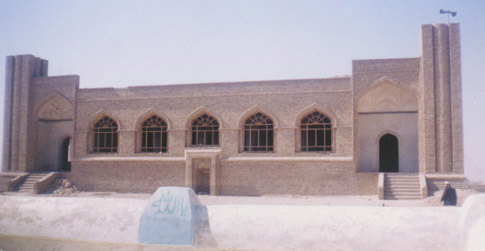
[caption: A shrine in Herat.]
The taxi stopped in front of Mobin's house, I stepped down and kissed the ground, then looked up at the sky. The fall breeze blew the dust in my eyes, but I could still see the constellations, shooting stars and the moon. That's the closest I have gotten to euphoria.
The people I knew in Herat were distant relatives with the exception of my step-grandmother, who still lives on our land. My mother's uncle was the only one who knew I was coming because he was one of the few owners of a telephone. I stayed with his two wives and their children. They were fairly well off and rebellious. Disobeying the Taliban's ban on music and television, a satellite dish propped up on their porch, a television and musical instruments in the basements. My five female cousins, mostly teenagers, did not clandestinely go to home schools as did some girls. They did their house chores and learned to read the Koran from a religious teacher for an hour a day while their 15-year-old brother attended public high school and took English courses.
This family's attitude toward the Taliban was typical of other Heratis. They have accepted the limitations in exchange for peace. However, they want Ismail Khan back in power. While warlords, once freedom fighters against the Russians, fought each other, Ismail Khan began to develop Herat, and he was still corrupt but better than the Taliban, my relatives said.
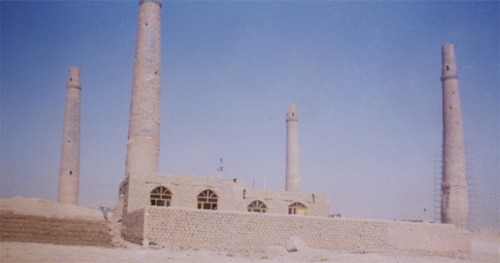
[caption: Few of the minarets built during the 15th century Timurid Empire are still standing. Others were toppled during the past 20 years of war.]
The ruling militia has instilled a chilling fear in Afghans, especially women. Since Herat is the Taliban's base for money, they give its residents more leeway to break the law. Heratis take advantage, but they go about it in a schizophrenic manner. My cousins would drum on their tambourines at midnight, cursing the Taliban as they sang. The next day, the girls whispered in conversation, afraid the Taliban were coming to get them. One way of appeasing the Taliban was to invite their ringleaders to parties where they joined in the festivity.
I kept a low profile, not asking too many questions and staying inside most of the time. I fit in surprisingly well despite my liberal ideas and informal mannerisms. My relatives assumed I had forgotten the Persian language and Islam, both of which I have kept.
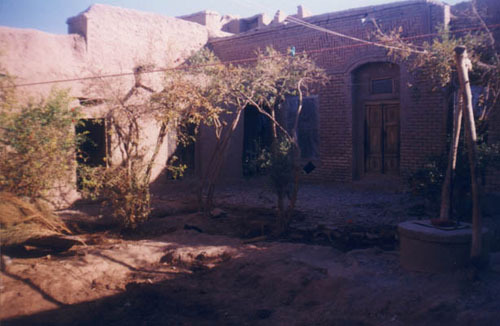
[caption: One of the sarachas; strangers live in my family home now.]
On the second day of my journey, I bravely put on the burqa like my mother used to and hit the streets for the first time with my cousins. I walked slowly embarrassed that I might trip on the flowing fabric. There is an ironic power in being invisible. Men in public noticed my ankles and hands, but they did not look at my eyes watching them. I stared at their expressions and actions, reading them without the interruption of their gaze.
We first rode a decorated Toyota Corolla taxi, then a horse wagon to reach my family home. I knocked at the old brass gate. A child opened the door and led me to my grandmother. She was praying. I lifted the front of my burqa as she turned her head. My grandmother, 70, screamed in disbelief like I was a ghost. She passed out for a few seconds before hugging me and sobbed on my shoulders.
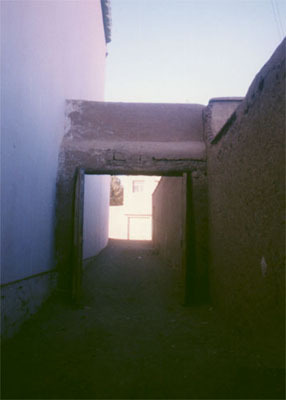
[caption: Our four-acre house in Herat was sold and divided into four small homes. This is the doorway leading to one of the sarachas.]
The next few days passed so quickly in glee. I went shopping, visited shrines and my school where I stopped attending after I witnessed a bomb kill my second-grade classmates 19 years ago.
On the seventh day of my trip back to Herat, I stepped into the orchard home, saving the best for last. I threw my burqa on the ground and sprinted toward the living quarters, hearing my family's laughter inside the hallways.
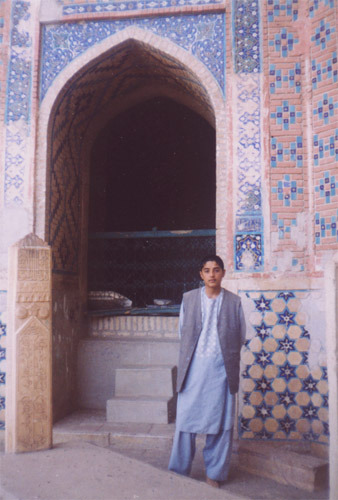
[caption: My cousin Ehsan, 16, stands in front of Gazergah where renowned Sufi poet Khwaja Abdullah Ansary is buried.]
But there was no one and no laughter. The doors of the 11 rooms were locked shut, some of their windows broken. I ran out to the field, frantically looking for the mulberry and pomegranate trees where we had picnics.
I found the trees but no harvest due to the drought. The entire place seemed much smaller. I kept running into walls. Then I recalled that my uncles sold three acres of the land a few years ago. My happy nostalgia turned into despair. I climbed the roof overlooking the city, buried my face in my hands and wept.
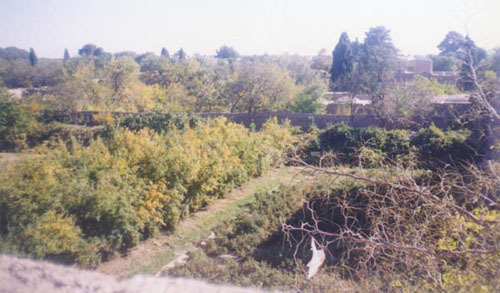
[caption: My maternal grandfather's orchard where all my happy memories of Afghanistan live. The orchard yielded little harvest because of the drought in the last couple of years.]
The tears were a catharsis, an acceptance of the past as past. My distance from Herat for these 20 years had left a void in me. I was missing something as I had lived my comfortable Western life in San Francisco. But 10,000 miles away, leaning at the edge of my childhood roof, I felt a sense of completion, that I was coming back full circle, fulfilling a spiritual journey.
About Fariba Nawa
Fariba Nawa, an award-winning Afghan-American journalist, covers a range of issues and specializes in women’s rights and conflict zones. She is based in Istanbul, Turkey and has traveled extensively to the Middle East, Central and South Asia. Visit Her Website
0 notes
Text
PTI demands removal of NADRA chief Usman Mobin for 'helping PML-N' | Pakistan
PTI demands removal of NADRA chief Usman Mobin for ‘helping PML-N’ | Pakistan
[ad_1]

NADRA Chairman Usman Mobin. Photo: File
ISLAMABAD: Pakistan Tehreek-e-Insaf (PTI) Chairman Imran Khan has reportedly decided to send a petition against the chairman of the National Database Registration Authority (NADRA) to the Election Commission of Pakistan (ECP) seeking his removal.
Sources said the PTI has prepared the petition against NADRA Chairman Usman Mobin to be sent to the…
View On WordPress
0 notes
Text
PTI demands removal of NADRA chief Usman Mobin for 'helping PML-N'
PTI demands removal of NADRA chief Usman Mobin for 'helping PML-N'
[ad_1]

NADRA Chairman Usman Mobin. Photo: File
ISLAMABAD: Pakistan Tehreek-e-Insaf (PTI) Chairman Imran Khan has reportedly decided to send a petition against the chairman of the National Database Registration Authority (NADRA) to the Election Commission of Pakistan (ECP) seeking his removal.
Sources said the PTI has prepared the petition against NADRA Chairman Usman Mobin to be sent to the…
View On WordPress
0 notes
Text
PM Imran Khan chairs NESR meeting on ‘Ehsaas’, orders to ensure mass participation
PM Imran Khan chairs NESR meeting on ‘Ehsaas’, orders to ensure mass participation
ISLAMABAD: Prime Minister Imran Khan received a detailed briefing regarding the formulation of NSER (National Socio-Economic Registry) under the “Ehsaas” program at PM Office Islamabad today.
The briefing was attended by Special Assistant to PM Dr. Sania Nishtar, Chairman NADRA Mr. Usman Yousaf Mobin and senior officers of BISP and Social Protection and Poverty Alleviation Division.
Read More:
View On WordPress
0 notes
Link
Prime Minister Imran Khan has said that the broadening of tax net is significant for enhancing the government's capacity to provide better facilities to the masses.
Talking to Chairman FBR Shabbar Zaidi, and Chairman NADRA Usman Yousaf Mobin in Islamabad, he said the broadening of tax net would not only lessen the burden on existing taxpayers, but would also enable the government to ensure the provision of education, health and other civic facilities in the country's far-flung areas.
The Prime Minister said the government is striving to bring transparency in tax system so that every patriotic citizen could play role in the country's progress and development.
0 notes
Link
Prime Minister Imran Khan has said that the broadening of tax net is significant for enhancing the government's capacity to provide better facilities to the masses.
Talking to Chairman FBR Shabbar Zaidi, and Chairman NADRA Usman Yousaf Mobin in Islamabad, he said the broadening of tax net would not only lessen the burden on existing taxpayers, but would also enable the government to ensure the provision of education, health and other civic facilities in the country's far-flung areas.
The Prime Minister said the government is striving to bring transparency in tax system so that every patriotic citizen could play role in the country's progress and development.
0 notes
Link
Prime Minister Imran Khan has said that the broadening of tax net is significant for enhancing the government's capacity to provide better facilities to the masses.
Talking to Chairman FBR Shabbar Zaidi, and Chairman NADRA Usman Yousaf Mobin in Islamabad, he said the broadening of tax net would not only lessen the burden on existing taxpayers, but would also enable the government to ensure the provision of education, health and other civic facilities in the country's far-flung areas.
The Prime Minister said the government is striving to bring transparency in tax system so that every patriotic citizen could play role in the country's progress and development.
0 notes
Link
(Bloomberg) -- The world’s 1.8 billion Muslims look to one country above all others.As the birthplace of Islam, Saudi Arabia is a symbol of purity for many who direct their prayers toward Mecca wherever they are in the world.The latest in a series of liberalizing reforms attributed to the modernizing influence of Crown Prince Mohammed Bin Salman runs counter to that reputation for religious conservatism.As they awoke to the news on Friday that women from outside the kingdom would no longer be required to wear the flowing abaya that’s been mandatory for decades, Muslims in Asia broadly welcomed the shift. But many also expressed misgivings about the overall direction of the lodestar of the Islamic world, and wondered just how far the changes would go.“I view Saudi Arabia as the most sacred place for a Muslim,” said Amirah Fikri, 30, an administrator in the Malaysian capital, Kuala Lumpur, who called the kingdom “an example of a Muslim country in the eyes of the world.”While reforms such as allowing women to drive and to travel without a guardian’s approval are positive, some things “are better left unchanged,” she said. The risk is of “harming the purity of Saudi when new, non-Islamic practices start to spread in the holy place.”Khashoggi MurderThe Saudi bid to appeal to tourists with a relaxed dress code for foreign women and the promise of easier access to the country is aimed at diversifying the economy away from its overwhelming reliance on oil. But it also serves to present a softer image of the kingdom to the west at a time when its reputation is distinctly mixed.The crown prince was excoriated internationally over the gruesome murder in Turkey last year of columnist Jamal Khashoggi, and his prosecution of a bloody war in Yemen resulting in famine and thousands of civilian casualties prompted Germany and other countries to halt weapons sales to Saudi Arabia.At home, the kingdom’s extensive use of the death penalty, torture, arbitrary detentions of rights activists and “severely restricted” freedoms are among the issues cited by Amnesty International in its overview of Saudi Arabia. “Despite limited reforms, including allowing women to drive, women faced systematic discrimination in law and practice and were inadequately protected against sexual and other violence,” Amnesty says.Yet that evidence of the country’s deeply conservative nature and its rigid interpretation of Islam helps to give a sense of the potential for domestic resistance to any kind of modernizing reform -- and the risks to the crown prince in pursuing change.“Tourism of course will help the economy, but if it involves anything that goes against our religious beliefs then it will not be accepted,” said Sultan, a 33-year-old resident of Riyadh, who only gave his first name. “Our religion is more important than anything.” Foreign tourists will “import their culture” and “over time, these ethics and values will be stripped away from our conservative society.”Necessary ChangeYet for many in Indonesia, the most populous Muslim country in the world, Saudi Arabia has no choice but to open up.“Change is a necessity,” said Nasaruddin Umar, Grand Imam of Istiqlal Mosque in Jakarta. “There will be pressure from the traditional clerics group in the country. But I see what MBS is doing as a smart move because he does so in a measured way.”Didik Saputra, a 32-year-old high school teacher from Depok in West Java, one of the most conservative Muslim provinces in Indonesia, spoke while on a visit to the country’s largest mosque in central Jakarta during its renovation and expansion.“Saudi Arabia must accept changes without totally eliminating the old customs and practices,” he said over the noise of construction workers. “I agree with MBS that Saudi Arabia must be progressive and promote modernization of Islam. That would be good as it will also improve the image of Islam in the world.”Beliefs and CultureThe threat of liberalization jeopardizing Saudi Arabia’s global standing among devout Muslims is a proposition dismissed by Ahmed Al-Khateeb, chairman of the Saudi Commission for Tourism and National Heritage and a key adviser to the crown prince. Saudi Arabia is any case no stranger to foreign visitors, he said.“We don’t expect this to affect Saudi Arabia’s image as the host for the Muslim world,” he told Bloomberg Television in Riyadh on Thursday. “The Muslim world knows that Saudi Arabia follows rules and has beliefs and culture.”Saudi Arabia has suffered far worse damage to its reputation in the recent past. It’s less than two decades since the kingdom almost became an international pariah after al-Qaeda leader Osama bin Laden, a Saudi national, claimed the worst terrorist attack on U.S. soil.The country’s post-World War II alliance with the U.S. survived the 9/11 attacks orchestrated by bin Laden. Donald Trump chose Saudi Arabia as the destination for his first overseas trip as president, and was quick to rally to its side after this month’s attacks on Saudi oil installations widely attributed to regional rival Iran. However, that dependence on the U.S., more than Saudi Arabia’s reform efforts, is regarded with suspicion by some Muslims.“Saudi has lost her nobility ever since they chose to be in bed with the United States to fund extremist groups and create violent conflicts in their neighboring Arab countries,” said Fatin Mohd Husni, 29, a teacher in Malaysia. “So I see these reforms as neither diminishing nor harming the purity of Saudi, because there’s nothing so pure about the Saudi administration to begin with.”Drawing a LineIn India, with some 200 million Muslims, men heading out of Friday prayers at the Jama Masjid adjacent to Parliament House in New Delhi welcomed Saudi Arabia’s move to open up.“Muslims across the world should support Saudi Arabia’s decision,” said Fazle Mobin Siddique, 45, secretary at the Diamond Charitable and Educational Trust in the central-Indian city of Nagpur. “This is a progressive step for Islam. Excessive restrictions on women and the moral police needed to go.”For Tauqueer Khan, 40, a government consultant, Saudi Arabia’s reforms are an effort to counter the stigma of being “synonymous with backwardness, extremism, radicalism and terrorism” and show the world it too can change with time.“These changes up to a certain level is OK,” he said. “But if they go beyond these and open up a pub with liquor, it will not acceptable at all. The Muslim world looks on Saudi as the guardian of Islam. If they go beyond a certain level, obviously, the Muslim community will not like that.’’\--With assistance from Donna Abu-Nasr, Sarah Algethami and Bibhudatta Pradhan.To contact the reporters on this story: Anisah Shukry in Kuala Lumpur at [email protected];Arys Aditya in Jakarta at [email protected];Archana Chaudhary in New Delhi at [email protected] contact the editors responsible for this story: Alan Crawford at [email protected], Mark WilliamsFor more articles like this, please visit us at bloomberg.com©2019 Bloomberg L.P.
from Yahoo News - Latest News & Headlines https://ift.tt/2nNcK2v
0 notes
Photo
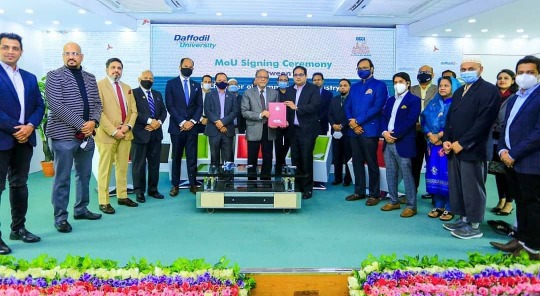
#DIU_signed_MoU_with_DCCI 📍 Daffodil International University (DIU) has signed a Memorandum of Understanding (MoU) with the Dhaka Chamber Of Commerce And Industry (DCCI) to work jointly for skill development. Professor Dr. S M Mahbub Ul Haque Majumder, Acting Vice-Chancellor of DIU and Mr. Shams Mahmud, President of DCCI signed the document on behalf of their respective organizations held at the university's 71 Milonayoton today. ✅ According to the agreement, both organizations will jointly organize various seminars, conferences, trainings, workshops, job fairs, research activities, surveys, short courses, etc. ✅ Daffodil International University will share 10 percent of the course fees for the certificate courses conducted by DCCI. On the other hand, DCCI will share 10 percent of the course fee for the certificate courses conducted by Daffodil University. Daffodil University will also provide course materials, instructors, venues, classrooms etc. ✅ Dr. Md. Sabur Khan, Founder and Chairman, Board of Trustees, DIU, DCCI Senior Vice President N K A Mobin, FCA, FCS, Vice President Mohammad Bashiruddin, Directors Monowar Hossain & S M Zillur Rahman, DCCI President (elect) Rizwan Rahman, Convenor of DCCI’s standing committee on Skills Development Golam Zilani, Secretary General (Acting) Afsarul Arifeen and Secretary Md. Joynal Abdin, DIU Treasurer, Mr. Mominul Haque Majumder, Registrar, Professor Dr. Engineer AKM Fazlul Haque, Dean, Faculty of Business and Entrepreneurship, Professor Dr. Mohammed Masum Iqbal were present during these MoU signing ceremony. https://www.instagram.com/p/CJXuZskj19w/?igshid=17vywuitbtuiq
0 notes
Video
vimeo
Director’s Cut. Much love and gratitude to everyone who spent so many long days and extra hours to make this Dir's cut happen! (Zoe, Andy, Paul, Kris, Grace & Dallas). And to all the kind people who welcomed me to their homes for the sound interviews. It was their honest and inspiring words that gave the most heart and meaning to this piece. An interactive version of this film was made available to all 2 billion Facebook users in July 2018. Every user was able to customize it with their own personal photos and share their own version. Director: Diego Contreras DP: Guillermo Garza Producer: Jonathan Dawes Production Designer: John Hammer Production Designer (Barcelona): Delfin Emiliano 1st AD: Chuck Conner Steadicam: Liam Clark (LA), Jose A. Santos (Barca) Aerials: Vortex Production Company: RESET Managing Director: Dave Morrison EP: Deannie O’Neil Prod. Supervisor: Grace Campos Director’s Assistant: Alfonso Algara Client / Agency: Facebook Agency Producer: Lyra Rider Creatives: Daniel Ilic, Luke Wicker, Jenna Livingston, Ed Vince, Dinesh Dave Casting: Kris Hutchinson | Extras Extras Barcelona Service Company: 24/7 24/7 EP: Olga Jabal Stylist LA: Chris Araujo Stylist Barcelona: Carolina Gadiana Editor: Zoe Mougin | Rock Paper Scissors Asst. Editor: Sebastian Zotoff Edit Producer: Lauren Pullano, Rebecca Baker Colorist: Paul Yakono | A52 Color Producer: Jenny Bright VFX / Animation: A52 & Elastic VFX Supervisor: Andy Barrios Elastic Creative Director: Ahmet Ahmet Producer: Sarah Laborde Production Coordinator: Andrew Rosenberger Sound Design and Mix: Defacto Sound VOs / Special Thanks: Saury Contreras, Mobin Khan, Michelle Gray, Jacob Garcia, Lavelle Roby, Ramond Ma, Nimi Adokiye, David Cooke, Ashton Sterling, Moses Alcala, Marie-Claude Jacques, Vennesa Ramos, Jens Jacob, Lyzt, Chai Sutradhar, Michael & Andrea Varelas, Somerlea Contreras, Anna Gabriela, Winter Quan.
0 notes
Text
Walking a tightrope: Pakistan struggles to juggle multiple balls
By James M. Dorsey
A podcast version of this story is available on Soundcloud, Itunes, Spotify, Stitcher, TuneIn, Spreaker, Pocket Casts and Tumblr
Pakistan risks falling off the tightrope it walks as it attempts to balance its relations with rivals Saudi Arabia and Iran.
Developments in recent days, including this weekend’s Baloch nationalist attack on a luxury hotel in the strategic port city of Gwadar and a legal dispute over completion of a gas pipeline against the backdrop of Saudi-Iranian-Qatari competition for the Pakistani gas market, suggest that Pakistan is caught between a rock and a hard place.
The South Asian nation’s seemingly unsustainable tightrope walk is likely to have consequences for the security of China’s massive US$45 billion investment in the China Pakistan Economic Corridor (CPEC), a crown jewel of Beijing’s Belt and Road initiative; an approximately US$10 billion planned Saudi investment in a refinery and a copper mine in the troubled Pakistani province of Balochistan; and Pakistani hopes of getting a grip on political violence in a bid to attract further badly needed foreign investment and avoid sanctioning for inadequate counterterrorism measures.
The assault on the highly secured hilltop Zaver Pearl Continental Hotel Gwadar, part of Pakistan’s largest luxury hotel chain, in which four people, including three gunmen were killed, was the second incident since Pakistani prime minister Imran Khan and Iranian president Hassan Rouhani last month agreed to step up security cooperation along their 959-kilometre long border.
Many Baloch, members of an ethnic minority on both sides of the border, feel economically disadvantaged and marginalized with a minority harbouring nationalist aspirations. Security-led repressive policies by both Iran and Pakistan have fuelled militancy and offer ample opportunity for manipulation by regional powers.
In an emailed statement claiming responsibility for the hotel attack, Baloch Liberation Army (BL) spokesman Jihand Baloch said this weekend’s attack targeted “Chinese and other investors who were staying at the PC hotel.” The hotel was believed to have few guests because of Ramadan.
In an earlier statement issued last week after an attack on a coal mine in which five people were killed, Mr. Baloch asserted that "Balochistan is a war-torn region and we will not allow any investments until the independence of Balochistan."
BLA operatives have in the past seven months hit various Chinese targets beyond the boundaries of Balochistan, including a convoy transporting Chinese engineers in Karachi and the People’s Republic’s consulate in the city.
Baloch nationalist militancy is not the only problem confronting Pakistani security forces in the strategic southwest of the country. The Islamic State claimed responsibility for an attack last month on a market in the Baloch capital of Quetta frequented by Hazaras, a beleaguered Shiite minority, in which 19 people were killed and dozens injured.
Iran blamed allegedly Saudi and US-backed Balochistan-based Sunni Muslim militants for an assault in February on the Iranian side of the border that killed 27 Revolutionary Guards.
In an apparent bid to build confidence, Mr. Khan admitted during his visit to Tehran that militants operating from Pakistan had attacked targets in Iran but vowed to put an end to that.
Complicating Mr. Khan’s efforts to walk a fine line between Saudi Arabia and Iran and safeguard crucial Chinese and future Saudi investment is the fact that the Trump administration’s stepped up maximum pressure campaign against the Islamic republic is restricting the South Asian nation’s ability to live up to prior commitments to Iran and fuelling Iranian concern that Saudi Arabia is able to influence Pakistani policy.
Jeddah-based Arab News quoted Mobin Saulat, the managing director of Pakistan’s state-owned Inter State Gas Systems, as advising his Iranian counterparts that US sanctions were preventing it from completing the Pakistani leg of an agreed gas pipeline despite statements by Messrs. Khan and Rouhani that they were seeking to enhance connectivity between their two countries.
Iranian suspicion of Saudi covert activity in Balochistan as well as the kingdom’s ability to influence Pakistani policy stems from multiple factors that Tehran sees as indicators.
These include massive Saudi financial assistance to help Pakistan avert a financial crisis, question marks among international oil executives of the economic rationale for the kingdom’s plan to build a refinery in Gwadar, a plan published by a Riyadh think tank calling for the fostering of an insurgency among Iran’s Baloch minority, reports by Pakistani militants of Saudi funding for anti-Shiite and anti-Iranian Sunni Muslim militants in Balochistan, and evidence of broader segments of the Pakistani population buying into Saudi-inspired ultraconservative interpretations of Islam as a result of the kingdom’s decades-long support of religious and cultural institutions as well as media.
Iran’s province of Sistan and Balochistan hosts the Indian-backed port of Chabahar, a mere 70 kilometres up the Arabian Sea coast from Gwadar. A shadowy militant Sunni Muslim group claimed responsibility for a rare suicide bombing in Chabahar in December.
Pakistan scholar Madiha Afzal noted in a just released Brookings report that “Saudi Arabia has succeeded in changing the character of Pakistan’s religiosity in a bid to expand its influence in the Muslim world, and in its mission to counter Iran.”
While US sanctions may have, at least for now, given the death knell to the Iran-Pakistan pipeline, Saudi influence appears to have failed in stopping Pakistan from entertaining a gas deal with Qatar, another of the kingdom’s nemeses, despite an almost two-year old Saudi-United Arab Emirates-led diplomatic and economic boycott of the Gulf state.
Qatar recently lowered the price in a bid for a major Pakistani liquified natural gas (LNG) contract in an effort to outcompete Saudi Arabia, that last month sent a delegation to Islamabad to discuss the South Asian nation’s gas needs.
The competition is about more than commercial advantage. While Qatar sees its gas exports as part of its soft power strategy, Saudi Arabia views the Pakistani contract as part of an effort to establish the kingdom as a major trader and marketeer as it strives to position itself as a significant gas exporter over the next decade.
Pakistan’s ability to maintain its tightrope walk could be further endangered if it fails to convince the Financial Action Task Force (FATF), an international anti-money laundering and terrorism finance watch dog, that it is doing sufficient to meet the group’s standards.
Pakistan was last year grey listed by the group and risks being blacklisted if it fails to convince FATF in talks later this month that it has substantially improved its controls. Blacklisting listing would significantly curtail its access to international finance at a time that it is seeking a bailout by the International Monetary Fund. (IMF).
Juggling multiple balls is proving to be an increasingly difficult act in which Pakistan may be the country out on a limb but many of its partners have a stake in ensuring that it maintains its tightrope walk.
Dr. James M. Dorsey is a senior fellow at Nanyang Technological University’s S. Rajaratnam School of International Studies, an adjunct senior research fellow at the National University of Singapore’s Middle East Institute and co-director of the University of Wuerzburg’s Institute of Fan Culture.
#pakistan#balochistan#iran#China (PRC)#china#saudi arabia#saudi#qatar#Trump#Iran sanctions#iran news#islam#muslims#terrorism
0 notes